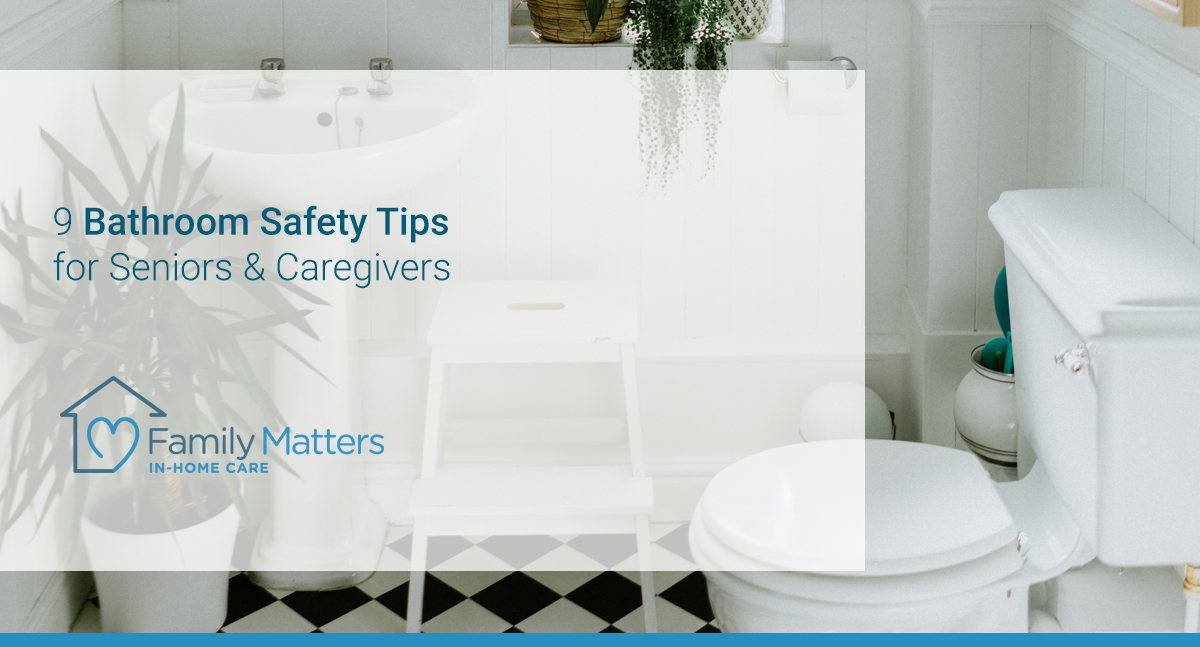
9 Bathroom Safety Tips for Seniors & Caregivers
Certain difficulties accompany the aging process, some of which you may not be prepared for as a caregiver. For example, many seniors struggle to navigate the bathroom because of limited mobility and health conditions.
Unfortunately, falling in the bathroom and other accidents can lead to serious injuries like broken bones or major cuts. Whether you’re a senior or a caregiver to an older loved one, read on to learn nine tips for creating a safer bathroom.
- Install Shower Bars for Stability
- Monitor Water Temperature
- Place Toiletries Within Reach
- Have Seating in the Shower
- Reduce Excess Items and Clutter
- Install More Lighting
- Add Traction in and out of the Bath
- Provide Supervision When Necessary
- Lift the Height of the Toilet
1. Install Shower Bars for Stability
Falls are a leading cause of injury and fatality among baby boomers. To reduce the risk of slipping in a wet shower or losing balance while bathing, have shower bars installed. These sturdy metal bars are usually placed along the inner wall of the shower. They can also be installed just outside the shower to make it easier to step inside.
2. Monitor Water Temperature
Burns are another common injury among elderly adults in the bathroom. Many seniors suffer from neurological concerns that can impact their sensitivity to temperatures. Conditions like multiple sclerosis and neuropathy make it harder to feel very low or very high temperatures.
Reduced temperature sensitivity increases the risk of suffering burns because it is difficult to feel how hot the water is. In order to avoid this, water temperature should be monitored by a supervising adult during bath or shower time.
3. Place Toiletries Within Reach
Toiletries must always be within reach for anyone who needs to use them. Shampoo, conditioner, and soap should not be kept on a high shelf in the shower. They should also not be kept too low, such as on the floor of the tub.
Having to bend or strain to reach these items can lead to dizziness, loss of balance, and falling. Keeping toiletries waist or chest-high is ideal for older adults who struggle with limited mobility.
4. Have Seating in the Shower
Syncope, dizziness, and vertigo are all significant among older people. These issues can increase the chances of passing out — especially when taking a hot shower. To prioritize bathroom safety for the senior in your life, consider adding a shower seat to their bathroom.
Shower seats can be installed permanently into the shower itself, or you can purchase a portable seat, which can be placed anywhere.
5. Reduce Excess Items and Clutter
A cluttered, unkempt bathroom is a particularly dangerous place for an elderly adult with mobility issues. Tripping over a busy bath mat or having to step over random objects can increase the risk of falling.
When making the bathroom easier to navigate, you should remove excess items and clear away this clutter. Try to keep only the necessities within the bathroom and create wider, more open spaces.
6. Install More Lighting
Seniors often struggle with impaired vision due to the natural changes of the aging process. This can make it harder to see clearly, especially in dim lighting. A safe bathroom should be lit at all times.
Have overhead lighting that illuminates the room and plug in nightlights that will keep the room lit even in the dark. Light switches should also be easy to reach so that your loved one does not have to strain to turn the light on.
7. Add Traction in and out of the Bath
The bathroom can be a wet, slippery setting, which makes it very easy to fall while navigating it. Older adults are at an increased risk of falling due to balance issues and limited mobility, which makes slippery surfaces even more dangerous.
There should be plenty of traction on the floor to reduce the risk of slipping and falling. A quality bath mat can be placed inside the shower, with another one immediately outside of it.
8. Provide Supervision When Necessary
Sometimes, a little extra help is needed in the bathroom in order to remain safe. If the senior under your care suffers from vertigo or is prone to falling down, they may need assistance when showering.
Seniors who have cognitive concerns like Alzheimer’s disease or dementia often require supervision when bathing or using the bathroom to make sure they do not harm themselves in any way.
9. Lift the Height of the Toilet
Sitting down on a low toilet seat can be difficult for seniors who have stiff joints or arthritis. Struggling to sit on the seat can actually lead to a fall if not handled properly. To make sitting on the toilet easier, you can have a toilet installed higher or add a booster to the existing toilet seat.
Maintaining Safety for Seniors in the Bathroom
From installing shower bars to lifting the height of the toilet, there are many ways to make the bathroom a safer place for seniors. If you are a caregiver looking to improve the safety of a senior bathroom, you can always contact local resources or experienced contractors for guidance.
If you or your family member is considering in-home care as part of a plan to age in place, contact Family Matters In-Home Care today for a free consultation. Our team is dedicated to supporting your family and helping older adults enjoy life in the comfort of their own home for as long as possible.
Some of the services offered by Family Matter In-Home Care include: Alzheimer’s & Dementia Care, Bed & Wheelchair Transfer Assistance, Companionship, Housekeeping & Meal Preparation, Personal Care, Recovery Care, and Transportation.
Serving the San Francisco Bay Area and Greater San Diego, Family Matter In-Home Care has offices throughout California including: Campbell, CA, Roseville, CA, San Marcos, CA, and San Mateo, CA.
